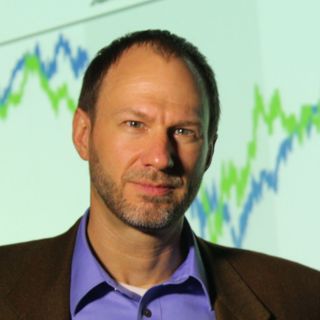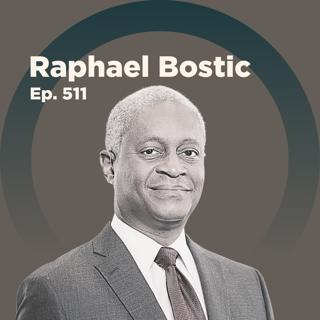
46 – Tim Duy on the Art of Fed Watching and the Future of U.S. Monetary Policy
Tim Duy is a professor of economics at the University of Oregon and a widely read “Fed Watcher.” Today, he joins the show to discuss writing on the Federal Reserve and how to interpret statements from Fed officials. In particular, Tim stresses the importance of the Fed Chair’s post-FOMC meeting press conferences. He also warns against taking too much stock in FOMC minutes. David and Tim also discuss the proper role of the Fed’s balance sheet in stabilizing monetary policy. David’s blog: http://macromarketmusings.blogspot.com/ Tim Duy’s homepage: http://pages.uoregon.edu/duy/ Tim’s “Fed Watch” blog: http://economistsview.typepad.com/timduy/ Tim’s Bloomberg archive: https://www.bloomberg.com/view/contributors/AC6KX2KfHjM/timothy-a-duy David’s Twtter: @davidbeckworth Tim’s Twitter: @TimDuy
27 Helmi 20171h 2min

45 – Hester Peirce on *Reframing Financial Regulation*
Hester Peirce is a Senior Research Fellow at the Mercatus Center at George Mason University and director of Mercatus’ Financial Markets Working Group. She joins the show to discuss the new Mercatus book, *Reframing Financial Regulation: Enhancing Stability and Protecting Consumers*, which she coedited. The book examines the problems with the United States’ current financial regulation regime (including the Dodd-Frank Act) and offers alternative policies that rely less on a centralized regulation and more on market discipline. David’s blog: http://macromarketmusings.blogspot.com/ Hester’s Mercatus profile: https://www.mercatus.org/hester-peirce David’s Twitter: @davidbeckworth Hester’s Twitter: @HesterPeirce *Reframing Financial Regulation: Enhancing Stability and Protecting Consumers* edited by Hester Peirce and Benjamin Klutsey https://www.mercatus.org/publications/reframing-financial-regulation
20 Helmi 201755min

44 - Sebastian Mallaby on Alan Greenspan's Legacy
Sebastian Mallaby is a senior fellow at the Council on Foreign Relations and a contributing columnist for the Washington Post. Today, he joins the show to discuss his new book, *The Man Who Knew: the Life and Times of Alan Greenspan,* a biography of the former Fed Chairman. Sebastian describes Greenspan’s humble origins, his rise to power, and his public career that spanned several decades. David and Sebastian discuss the degree to which Greenspan should be praised for the economic stability of the Great Moderation and blamed for the Great Recession. They also chat about Greenspan’s musical talents, his relationship with Ayn Rand, and his reputation as a “ladies man.” David’s blog: http://macromarketmusings.blogspot.com/ Sebastian’s bio: http://www.cfr.org/experts/financial-crises-regional-security-economics/sebastian-mallaby/b4452 Sebastian’s Washington Post archive: http://www.cfr.org/experts/financial-crises-regional-security-economics/sebastian-mallaby/b4452 David’s Twitter: @davidbeckworth Sebastian Mallaby: @scmallaby *The Man Who Knew: the Life and Times of Alan Greenspan* by Sebastian Mallaby http://www.cfr.org/international-finance/man-knew/p37530
13 Helmi 201758min

43 – Eswar Prasad on Chinese Monetary Policy – Past and Present
Eswar Prasad is the Tolani Senior Professor of Trade Policy and Professor of Economics at Cornell University and a senior fellow at the Brookings Institution. He joins the show to discuss his new book, *Gaining Currency: The Rise of the Renminbi,* which examines the rise of China’s currency, the renminbi (RMB), and its role in global finance. Prasad argues that the RMB is on the road to becoming a reserve currency, but it will not challenge the US dollar’s dominance as a safe haven currency. David and Eswar also discuss China’s interesting history as the first country with paper money and a fiat currency. David’s blog: http://macromarketmusings.blogspot.com/ Eswar’s Cornell homepage: http://prasad.dyson.cornell.edu/ Eswar’s Brookings homepage: https://www.brookings.edu/experts/eswar-prasad/ David’s Twitter: @davidbeckworth Eswar’s Twitter: @EswarSPrasad Related links: *Gaining Currency: The Rise of the Renminbi* by Eswar S. Prasad https://global.oup.com/academic/product/gaining-currency-9780190631055?cc=us&lang=en&
6 Helmi 20171h 2min

42 – Jesus Fernandez-Villaverde on European Economic History and Macroeconomic Modeling
Jesus Fernandez-Villaverde is a professor of economics and director of graduate studies of economics at the University of Pennsylvania. He joins the show to discuss both his extensive work in economic history as well as macroeconomic modeling. David and Jesus discuss the economic history of Germany in the 1920s and 1930s and the events that led to the rise of the Nazis as well as more recent events such as the struggles facing the Eurozone. They also discuss debates surrounding the usefulness of current-day macroeconomic models. David’s blog: http://macromarketmusings.blogspot.com/ Jesus’ webpage: http://economics.sas.upenn.edu/~jesusfv/ David’s Twitter: @davidbeckworth Related links: “The econometrics of DSGE models” by Jesus Fernandez-Villaverde http://economics.sas.upenn.edu/~jesusfv/econometricsDSGE.pdf “Computing DSGE Models with Recursive Preferences and Stochastic Volatility” by Dario Caldara, Jesus Fernandez-Villaverde, Juan Rubio-Ramirez, and Wen Yao https://www.federalreserve.gov/pubs/feds/2012/201204/201204pap.pdf “The Trouble with Macroeconomics” by Paul Romer https://paulromer.net/wp-content/uploads/2016/09/WP-Trouble.pdf
30 Tammi 20171h 2min

41 - Gauti Eggertsson on the Zero-Lower Bound and Liquidity Traps
Gauti Eggertsson is a professor of economics at Brown University. Previously, he worked at the research departments at the International Monetary Fund and the Federal Reserve Bank of New York. He joins the show to discuss his work on the history of liquidity traps and extremely low and even negative interest rates. He and David discuss examples from the Great Depression to Japan in the 1990s to today. Gauti also shares his thoughts on the Fed’s quantitative easing (QE) program and why it failed to return the economy back to normal. David’s blog: http://macromarketmusings.blogspot.com/ Gauti’s Brown University homepage: https://sites.google.com/site/gautieggertsson/home David’s Twitter: @davidbeckworth Related links: “The Zero Bound on Interest Rates and Optimal Monetary Policy” by Gauti Eggertsson and Michael Woodford https://www.brookings.edu/bpea-articles/the-zero-bound-on-interest-rates-and-optimal-monetary-policy/ “Great Expectations and the End of the Depression” by Gauti Eggertsson https://www.newyorkfed.org/medialibrary/media/research/staff_reports/sr234.pdf “The Fed’s Dirty Little Secret” by David Beckworth http://people.wku.edu/david.beckworth/fed_dirty.pdf “Japan’s Trap” by Paul Krugman https://www.princeton.edu/~pkrugman/japans_trap.pdf
23 Tammi 20171h

40 - Anat Admati on Debt, Equity, and Financial Instability
Anat Admati is the George G.C. Parker Professor of Finance and Economics at Stanford University’s Graduate School of Business and co-author of the book, *The Bankers’ New Clothes: What’s Wrong with Banking and What to Do About It.* She joins the show to discuss her book, which argues that America’s banking system continues to be dangerously fragile even in the aftermath of the Dodd-Frank Act. Anat argues that banks take on too much leverage and that they should be required to hold more equity. David’s blog: http://macromarketmusings.blogspot.com/ Anat’s Stanford profile: https://www.gsb.stanford.edu/faculty-research/faculty/anat-r-admati David’s Twitter: @davidbeckworth Anat’s Twitter: @anatadmati Related: *The Bankers’ New Clothes: What’s Wrong with Banking and What to Do About It* by Anat Admati and Martin Hellwig http://bankersnewclothes.com/ Anat’s paper, “It Takes a Village to Maintain a Dangerous Financial System” http://bankersnewclothes.com/wp-content/uploads/2016/06/Takes-a-Village-May-2016.pdf
16 Tammi 20171h 3min

39 - Allan Meltzer on the Monetarist Counterrevolution and Economic Reforms
In this week’s special episode recorded in front of a live audience, David interviews the renowned monetary economist, Allan Meltzer. Meltzer, a professor of political economy at Carnegie Mellon University and one of the founders of the monetarist school of thought discusses his long career in academia and policy. David and Allan also discuss current central bank policy, both in the United States and abroad, and how monetary policy can become more rules-based. Finally, Allan also argues many of our current economic problems are real, not nominal, and he hopes a Trump Administration can address some of these woes. Note: this episode took place before the December 2016 interest rate hike by the Federal Reserve. David’s blog: http://macromarketmusings.blogspot.com/ Allan Meltzer’s bio: http://tepper.cmu.edu/our-faculty-and-research/about-our-faculty/faculty-profiles/am05/meltzer-allan David’s Twitter: @DavidBeckworth Related links: “A History of the Federal Reserve (Volumes I and II)” by Allan Meltzer (University of Chicago Press) http://www.press.uchicago.edu/ucp/books/book/chicago/H/bo3634061.html http://www.press.uchicago.edu/ucp/books/book/chicago/H/bo6887672.html “Keynes’s Monetary Theory: A Different Interpretation” by Allan Meltzer (Cambridge University Press) https://www.amazon.com/Keyness-Monetary-Theory-Different-Interpretation/dp/0521022754
9 Tammi 201753min






















